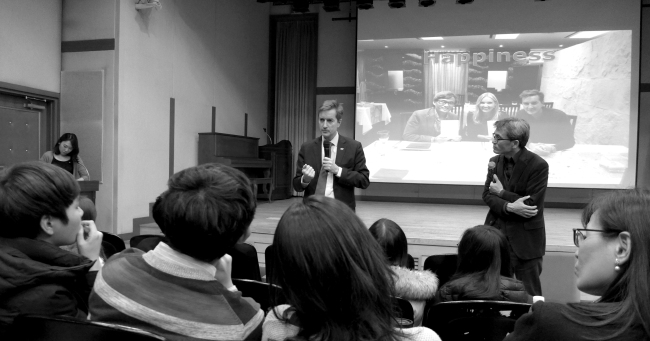The United Nation’s World Happiness Report listed Denmark as the world’s happiest nation in 2013 and 2014, while it came in at third place behind Switzerland and Iceland this year.
When Koreans think of the Nordic nation, they conjure up ideas of work-life balance, plentiful welfare and fancy lifestyles, an egalitarian utopia far from “Hell Joseon,” a phrase Korean youth have recently used to describe Korea’s structural malaise.
In the same report, Korea was ranked 47th of 158 countries for this year, one spot behind Japan. Given the soaring income inequality, household debt, youth unemployment and elderly poverty, as well as plummeting birthrate and spiraling suicide rate, many were not surprised by the ranking.
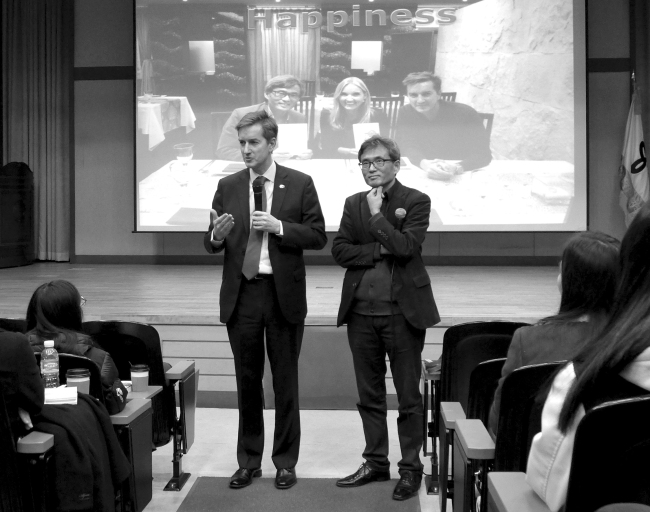 |
| Danish Ambassador Thomas Lehmann (left) and OhmyNews CEO Oh Yeon-ho speak at a lecture about happiness in front of students and citizens in Seoul on Thursday. Joel Lee/The Korea Herald |
Happiness is increasingly becoming an existential matter here, a country where most people say they do not lead fulfilling lives.
Oh Yeon-ho, the CEO of news outlet OhmyNews, traveled to Denmark six times for an answer. After interviewing 300 people from all walks of life, he published a book last year.
“There are six key words to understand Danish happiness ― freedom, stability, equality, trust, community and environment,” Oh said in a lecture in Seoul on Thursday, joined by Danish Ambassador Thomas Lehmann.
“These are values not exclusive to Denmark. We have long regarded them important, but Denmark enculturated and institutionalized them early on.”
On freedom, Oh said the Danish students were not bound by grades or rankings, and took one year after middle school to contemplate what to do in life. On stability, a social security net has provided free education, health care and unemployment benefits.
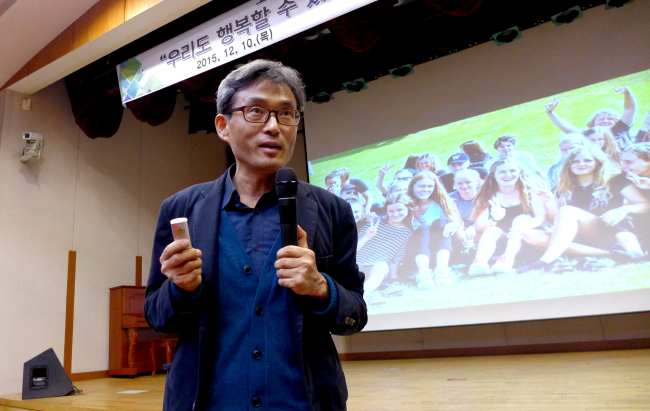 |
| Oh Yeon-ho, the CEO of news outlet OhmyNews. Joel Lee / The Korea Herald |
Danish citizens enjoy high levels of equality, the journalist-CEO claimed, noting that people did not covet high-paying occupations, like doctors or lawyers.
Despite the tax that progressively curves up to 50 percent of income, Danes were “happy” to pay their civic dues, Oh said. They have participated in community affairs, cooperative associations and labor unions. Nature is nurtured. Nearly 40 percent of city-dwellers ride bicycles to work.
“Danish students maintain their happy outlook through elementary to high school,” the author highlighted. “Korean students, on the other hand, have a cheerful countenance in elementary school, which gets darker into middle school. They simply stop talking in high school.”
Unlike Korea, which creates 10 percent winners and 90 percent losers, Denmark enables everyone to be masters of their destiny, according to Oh. “The Danish education is alive for life. Students are administrators of their learning.”
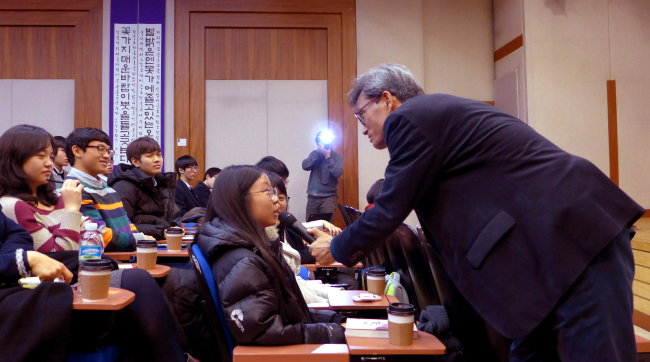 |
| Oh Yeon-ho, the CEO of news outlet OhmyNews. Joel Lee / The Korea Herald |
“To find out what you truly want in life, you have to seriously ponder and experience the things you like,” he added. “This requires investigating society and harnessing compassion.”
As Korean students are perennially obsessed with test scores and classroom rankings, they do not have time to cultivate these skills, Oh asserted.
Lehmann, who celebrated his birthday on the same day, noted that Denmark was not a fairytale society and has its own set of challenges. Acknowledging Korea’s achievements in a short span of time, he said the two countries could inspire and learn from each other.
“Our happiness comes from a combination of different aspects, such as education, environment, welfare and trust,” the ambassador said. “Education is where everything starts. Students are taught to make society more coherent and balanced.”
Children learn to play and live with others and be creative and collective, he pointed out, adding that these steps guaranteed life’s well-being and success. “Toy brand Lego means ‘play well’ in Danish,” Lehmann underscored.
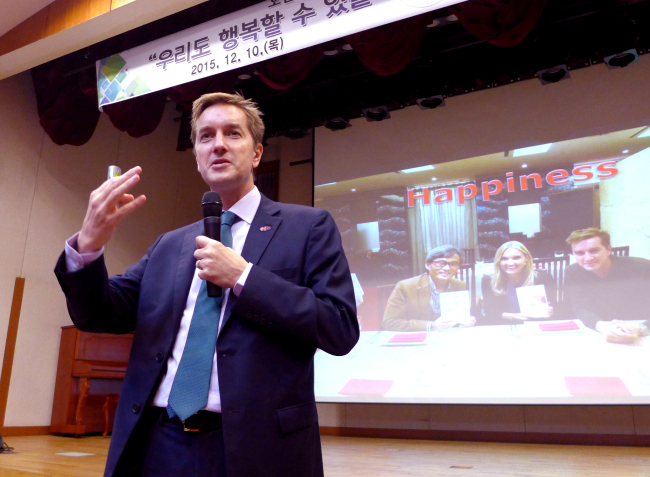 |
| Danish Ambassador Thomas Lehmann. Joel Lee / The Korea Herald |
Danish youth also engage in live interaction in the classroom and are unafraid to ask questions; they are encouraged to look for diverse career options.
Lehmann added that his compatriots intensely cared for the environment. In Denmark, people swim in the Copenhagen Harbor, drink tap water and derive energy from renewable sources.
“We are proud that our politicians have committed to 100 percent renewable energy ― wind, biomass, geothermal and solar ― by 2050, with no fossil fuel, gas or nuclear power,” the diplomat emphasized.
“We are also a rich nation with generous welfare for our education, health care, child care, unemployment and pension. This comes from high taxes, but we are happy to pay, knowing that we get a lot back.”
Equality permeates through the tight-knit fabric of society, across gender, occupation, age and religion, according to the envoy. “We don’t believe we are better than anyone else. Having a very humble attitude in life, people don’t envy others.”
Citizens trust the government, politicians, neighbors and businesses, strengthening social capital and making life more laid back and enjoyable.
“My happiest time is with my family ― my wife and 10-month-old daughter,” he said. “Having a fun time with your family and friends is called ‘hygge’ in Danish. It means an environment of friendliness, coziness and cheer.”
By Joel Lee (joel@heraldcorp.com)
